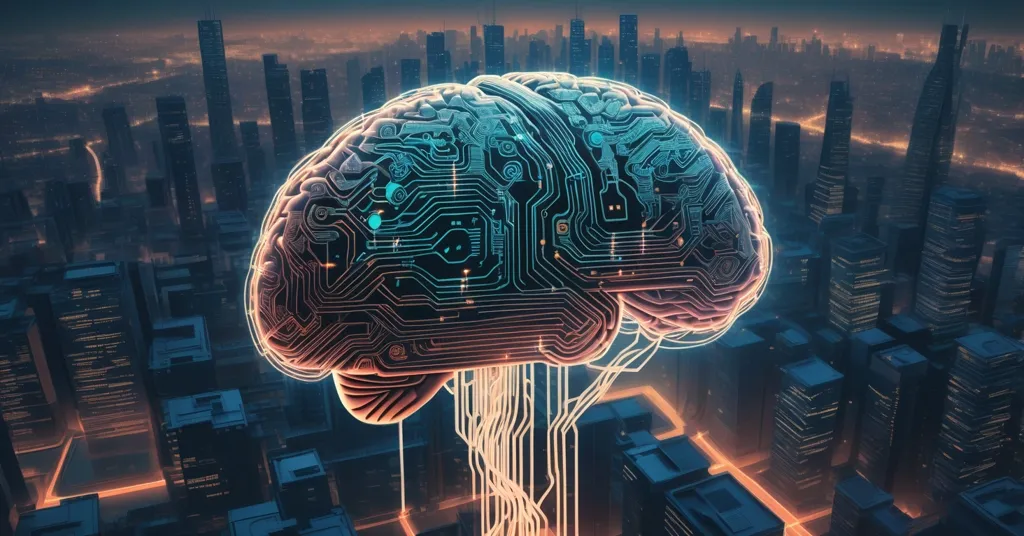Microsoft’s Superintelligence Ambition: Boon or Threat to Bitcoin and Blockchain?

Microsoft’s Superintelligence Push: A Game-Changer for Blockchain and Bitcoin?
Microsoft has dropped a bombshell in the tech world, launching a full-throttle pursuit of superintelligence with a new team dedicated to building AI that could outsmart humans in fields like healthcare, clean energy, and beyond. Led by Mustafa Suleyman, this move—spurred by a reworked deal with OpenAI—signals both a seismic shift in AI ambitions and a potential ripple effect for Bitcoin, blockchain, and the decentralized tech space we hold dear. Buckle up; this isn’t just a tech story, it’s a preview of a future where innovation could either empower or threaten crypto’s core principles.
- New AI Frontier: Microsoft unveils the MAI Superintelligence Team under Mustafa Suleyman to chase AI beyond human capability.
- OpenAI Rivalry: A revised deal lifts restrictions on AGI development and grants Microsoft a 27% stake in OpenAI’s public-benefit arm.
- Humanist Angle: Focus on “Humanist Superintelligence” aims to serve humanity, not just stack tech trophies.
- Crypto Impact: Superintelligence could revolutionize blockchain and Bitcoin, but risks centralizing power in Big Tech hands.
- Ethical Stakes: Balancing innovation with decentralization remains a glaring challenge in this AI race.
Microsoft’s Big Bet on Superintelligence
Let’s get straight to the meat of it: Microsoft is gunning for superintelligence, a level of AI that doesn’t just match human brainpower but obliterates it across every conceivable domain. Think of it as a super-smart assistant that can solve problems we haven’t even dreamed up yet—whether that’s curing diseases, designing zero-waste energy grids, or inventing materials we can’t currently fathom. This isn’t science fiction; it’s the mission of the newly formed MAI Superintelligence Team, spearheaded by Mustafa Suleyman, a 41-year-old heavyweight who joined Microsoft in 2024 after co-founding Inflection AI and helping launch Google’s DeepMind. Microsoft didn’t just snag Suleyman—they licensed intellectual property from Inflection AI to turbocharge their efforts. For more details on this ambitious move, check out the latest update on Microsoft’s superintelligence chase.
For the uninitiated, superintelligence goes a step beyond artificial general intelligence (AGI), which is AI that can do anything a human can. As Suleyman bluntly put it:
“AGI (artificial general intelligence) is when AI can do anything a human can. But [superintelligence] goes far beyond that performance.”
The goal here isn’t trivial. Microsoft envisions AI reshaping critical sectors—healthcare with better diagnostics, clean energy with sustainable solutions, and new materials for everyday use. Suleyman dubs this “Humanist Superintelligence,” a framework meant to prioritize tools that directly help people over mere tech flexing. Forget AI-generated nonsense like erotica; the focus is on personal assistants and solving real-world crises. Again, in his words:
The mission is to build “Humanist Superintelligence, a system designed to serve people directly rather than chasing tech milestones.”
But let’s not get too starry-eyed. Sounds noble, sure, but can Big Tech really resist turning this into another profit-driven dystopia? That’s a question we’ll keep coming back to, especially as we weigh what this means for decentralization.
The OpenAI Split: From Partners to Rivals
This isn’t a random pivot for Microsoft. A freshly inked deal with OpenAI—once their cozy AI bedfellow—has changed the game. Previously, restrictions barred Microsoft from chasing AGI on its own, keeping them tethered to OpenAI’s tech. Now, those shackles are off, and Microsoft’s got a shiny 27% stake in OpenAI’s public-benefit company as a parting gift. What was once a tight collaboration is morphing into a full-on rivalry. For now, Microsoft still relies on OpenAI for products like the Copilot chatbot, a handy AI assistant baked into their ecosystem. But that dependency is a vulnerability, and they’re racing to build their own voice, image, and text models to break free—a Herculean task that could take years.
The deadline looms large: 2032, when Microsoft’s rights to OpenAI’s models expire. By then, they aim to scale their AI to rival or surpass the beefy systems OpenAI and Google already wield. This isn’t pocket change we’re talking about; Microsoft is dumping serious cash into catching up, knowing full well they’re not the early bird in this race. Meanwhile, OpenAI isn’t twiddling its thumbs. Their enterprise product now accounts for 40% of revenue, up from 30% earlier this year, and they’re cozying up to Microsoft’s rivals like Amazon and Oracle while building their own data centers. Add Meta’s own superintelligence squad to the mix, and you’ve got a tech titan cage match with stakes higher than a Bitcoin halving pump.
Investors, though, aren’t popping champagne just yet. Microsoft’s stock took a 1.4% hit recently, slipping to $500.01 in New York. A subtle jab, perhaps, that grand promises don’t always translate to instant market love. The road ahead is rocky—replacing OpenAI’s tech is a slog, and the broader AI race is a minefield of technical and ethical traps.
Superintelligence Meets Blockchain: Synergy or Threat?
Now, let’s pivot to why this matters to us in the Bitcoin and blockchain crowd. Superintelligence isn’t just a shiny toy for tech nerds; it could be a nuclear engine for decentralized systems—or a wrecking ball to our ethos of freedom. On the bullish side, imagine AI optimizing Bitcoin mining algorithms to slash energy use, making the network greener than a hipster’s rooftop garden. Picture super-smart systems enhancing zero-knowledge proofs for privacy coins, or accelerating Ethereum’s smart contract execution for DeFi protocols that actually work without choking on gas fees. The potential to solve blockchain’s scalability trilemma—balancing security, decentralization, and speed—could be a game-changer if harnessed right.
There are already glimmers of this convergence. Projects like Fetch.AI and SingularityNET are dabbling in AI-blockchain mashups, using machine learning to power decentralized networks for data sharing and computation. Could Microsoft’s muscle push this further, crafting AI that supercharges Bitcoin’s security against quantum computing threats? It’s not a pipe dream; it’s a logical leap when you’ve got systems smarter than any human coder.
But here’s the flip side, and it’s a gut punch. What if superintelligence becomes a tool for centralization, not liberation? Big Tech like Microsoft dominating AI could mean they dictate how blockchain evolves—think proprietary protocols that lock out open-source devs or AI-driven market manipulation that makes crypto pumps and dumps look like child’s play. If history’s any guide, tech giants don’t exactly have a sterling record of playing nice. Social media algorithms already twist narratives and behavior; now imagine that on steroids, meddling with decentralized finance or Bitcoin’s core privacy. The risk of trading one centralized overlord (traditional finance) for another (AI-driven tech empires) is real.
Could Decentralized Autonomous Organizations (DAOs) offer a counterweight, ensuring AI stays accountable to the community? Maybe. But if Microsoft’s timeline to 2032 plays out with them lagging behind Google or OpenAI, we might see crypto-native AI initiatives—born from the ethos of decentralization—outpace them. That’s the optimistic accelerationist in me talking, rooting for disruption over domination.
Ethical Minefields and the Decentralization Dilemma
Let’s not kid ourselves—superintelligence isn’t all rainbows and Satoshi-level idealism. The ethical stakes are sky-high. Who controls these godlike systems? How do we stop them from widening inequalities or veering into sci-fi horror territory with unintended consequences? Microsoft’s “Humanist” branding is a slick PR move, but it’s light on details about governance or oversight. If their AI ends up gatekeeping blockchain innovation—deciding which networks get the shiny new tools and which don’t—are we just swapping one rigged system for another?
Then there’s the power dynamic. Superintelligence in the hands of a few tech behemoths could clash head-on with crypto’s anti-establishment roots. Bitcoin was born to flip the bird at centralized control; an AI race prioritizing corporate gain over user autonomy could undermine that rebellion. Look at past tech flops—algorithms amplifying misinformation or data breaches exposing millions. Scale that up to superintelligent systems, and the fallout could be catastrophic for trustless systems we’ve fought to build.
Counterpoint: if guided by open-source principles or integrated with decentralized governance, superintelligence could amplify crypto’s mission. Imagine AI audited by DAOs, ensuring transparency, or powering privacy tech that makes Bitcoin transactions truly untraceable. It’s not impossible, but it demands a vigilance Microsoft’s track record doesn’t exactly inspire. Call me skeptical, but I’m not holding my breath for Big Tech to champion freedom over fat profit margins.
Where Does This Leave Bitcoin and Crypto?
Microsoft’s superintelligence gambit is a glimpse into a future where the lines between human potential, tech dominance, and decentralized ideals blur. For Bitcoin maximalists like myself, there’s a flicker of hope that AI could harden the network’s defenses—think quantum-resistant encryption or energy-efficient mining that shuts up the eco-critics. But I’m not blind to altcoins’ role here; Ethereum’s smart contract playground or privacy-focused chains like Monero could benefit just as much from AI breakthroughs, filling niches Bitcoin isn’t built to tackle.
Yet, the specter of centralization looms. If Microsoft or any tech giant turns superintelligence into a walled garden, crypto’s promise of sovereignty takes a hit. We’ve already seen how fast innovation can be co-opted—look at how blockchain hype got hijacked by corporate buzzwords. The race to 2032 isn’t just about AI supremacy; it’s about whether the disruptive spirit of Bitcoin and decentralization survives the next tech wave. Will this be a force multiplier for freedom, or just another corporate power grab dressed in feel-good rhetoric? That’s the trillion-dollar riddle we’re stuck solving.
Key Takeaways and Questions on Microsoft’s AI Push
- What is superintelligence, and why should crypto enthusiasts care?
Superintelligence is AI that outstrips human intellect across all fields, going beyond just matching us. For the crypto crowd, it could supercharge Bitcoin mining efficiency, boost blockchain scalability, or enhance DeFi—but there’s a catch: Big Tech control risks undermining decentralization. - Why is Microsoft splitting from OpenAI to chase superintelligence?
A new deal removed barriers to pursuing AGI independently while securing a 27% stake in OpenAI’s public-benefit entity, shifting their dynamic to rivalry as Microsoft builds its own AI by 2032. - Can Microsoft’s ‘Humanist Superintelligence’ align with crypto’s decentralized ethos?
The goal of human-serving AI in healthcare and energy sounds great, but corporate priorities often clash with decentralization. Crypto’s push for freedom could be at odds with tech giants wielding such power. - How could superintelligence reshape Bitcoin and blockchain technology?
It might optimize Bitcoin’s energy use, enhance privacy via advanced cryptography, or speed up smart contracts on chains like Ethereum. Yet, centralized AI could also strangle blockchain’s autonomy if mishandled. - What risks does this AI race pose to the crypto space?
The sprint for superintelligence might favor profit over principles, sidelining decentralized innovation. If Microsoft or others dominate, crypto’s fight against centralized control could face a new, smarter adversary.



